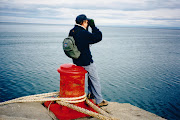Cornville, Arizona. Five hundred miles from the nearest ocean I meet Kevin: short, mustached, strong, sunburned, with muscled upper arms that show off the edge of a tattoo just under his white tee; he's set aside his long-sleeved red flannel shirt and hung it on a nearby rail. He tells me he's content as long as he's living "the free life of a sailor."
I have to blink. We're in the high desert. And Kevin is finishing up a job scraping and staining the wood deck of a mountain cabin.
"I'm from Wisconsin, see," he says, as if that explains it.
Actually, it does. Kevin grew up near Lake Superior, where he does carpentry work in the summer and fall for about eighteen dollars an hour ("we've still got plenty of Chicago millionaires up there, so there's no shortage of stuff to do"). He could, he told me, charge forty dollars an hour, the way some of his competitors do; but then he'd be sitting around too much waiting. And Kevin doesn't like to sit around doing nothing. He keeps busy up north, working until deer-hunting season is over, and maybe does a little ice fishing; then in January heads south to escape the coldest part of the Midwest winter, which he hates. For a long time he worked on the oil derricks in the panhandle of Texas, even though now and then he got punched in the face just for saying which part of the country he came from. "First time, I never even saw it coming. I just said, 'Wisconsin,' and WHAM!"
When the derricks shut down and the crews were reassigned to North Dakota, Kevin said no thank you. Global warming, he was certain, was making the North even colder--even though, he admitted, every year one or two of the ice fisherman who ventured out onto Lake Superior still had a big chunk of ice break off underneath them and carry them helplessly away. "And then," he frowned, "they have to come rescue you by helicopter, which is completely embarrassing."
Kevin sticks to inland waters, these days.
His land-lubbing life began after his three years in the Navy. All he'd wanted his whole life was a battleship, he said, his eyes hard and still disappointed. "It was a matter of pride, for me, to be on a battleship. That was my whole goal." Instead, he found himself assigned to the U.S.S. Sacramento, a supply ship ("well, with some guns," he allowed), following the nuclear battleship the U.S.S. Enterprise around wherever it went. For three years Kevin stalked the Enterprise, shadowing her every move, dreaming of sailing aboard her instead of merely outfitting her in the middle of the night. This was called "replenishment at sea"--a highly secret process, still a mystery to the Russians and the Chinese, in which a U.S. nuclear vessel was completely resupplied, in darkness, without being in port, and sometimes in high seas.
When his stint with the Navy was up, Kevin left the water and tried to settle down. From time to time he rented a house in Wisconsin and filled it with belongings. But somehow, every two or three years or so, he just couldn't take it anymore and had to sell everything he owned and leave in the dead of night. When I met him he'd just done it again, and was living in a small tent next to his pick-up truck on the banks of a wide, blue, rippling creek. He had no family and no responsibilities, he told me; he could go wherever he liked and do whatever he wanted. "See, hauling stuff around," he said, picking up his scraper and shrugging his shoulders, as though shaking something cold and hard off, but then recovering, "is just not my thing."--MD













No comments:
Post a Comment